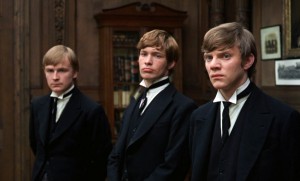From Columbine to Virginia Tech to Sandy Hook Elementary, today’s schools are more hostile environments than ever. Every time an American student opens fire on his or her classmates, the nation looks for something new to blame: the young shooters, the parents, the guns. The arguments surrounding these tragedies go in a vicious cycle leading nowhere. But perhaps British filmmaker Lindsay Anderson’s 1968 controversial film “If….” can shed some light on this current epidemic.

“If….” begins on the first day of a new year at a secluded, all-boys boarding school in England. The staff runs things with an iron fist and every student seems miserable, excluding a few suck-ups, including the human punching bag, Stephans (Guy Ross). We are introduced to Mick Travis, a rebellious upperclassman played by Malcolm McDowell in his film debut. He went on to star in Stanley Kubrick’s “A Clockwork Orange” (1971) among others. McDowell’s performance is what makes this movie so enjoyable. Rarely do we see an angry adolescent played in such a subtle way.
Mick and his two friends (played by David Wood and Richard Warwick) loathe everything about their school, from the strict teachers and their biased lectures to the mandatory Sunday masses said by a dictatorial priest who preaches to the students why they are all going to hell. In a sea of clean-cut British school lads, these three scheming faces stick out.
While the boys are young and not so innocent, Anderson never depicts the three as evil. The movie’s antagonists are instead the school’s faculty, or “Heads of the House.” These soulless adults march through the halls, yelling at misfits and slapping the backs of heads of children who do not pay attention. In one scene, Mick and his friends are given a beating by the school heads, simply because their “general attitudes” were causing a “nuisance.”
Although the film is set in the late 1960s, it looks and feels more like the early 1940s: old-fashioned and uncomfortably conservative. During a time when filmmakers were breaking rules, Anderson took this approach and applied it to an old setting as a way of satirizing the U.K. public school system. Anderson said that he drew from personal experiences of attending boarding school when he was rewriting the script. Maybe not at first, but over time, “If….” begins to feel like an art film. Anderson randomly switches from color to black-and-white, he unexplainably slows down scenes and the story arch is occasionally interrupted by dream-like sequences with naked women. All this is done to illustrate the rough lives of these youths in a poetic way.
During the film’s climax, Mick and his friends use military tactics, which they learned at school, to ambush the faculty in a bloody school massacre, during which several staff, deans, priests and students are killed in a rain of bullets. “If….” was released during the hippie-flower children movement, a time when most youths rebelled against society with messages of peace and love. Anderson expressed an alternative route full of anger and violence.
This old British school system is completely unrelated to the American high schools of today, yet school shootings have drastically increased with the current generation of young people. Watching “if….”, we cannot help but wonder: do the teenage gunmen of today share the same motives that spurred Mick Travis and his friends? Is there something that can be learned here to help answer questions about gun violence?
David Sherwin’s script was originally titled “Crusaders,” but Anderson had it changed to an even simpler name: “If….” I think the reason is that he was curious how the world would change if these events occurred. What if young people revolted against their superiors with force instead of peace signs? What if the tradition-based school system was shaken to its core and shattered? What if kids walked into school one day and started killing people? Unfortunately, we now live in a world where the absurdity of Anderson’s “If….” has become too much of a sad reality.

